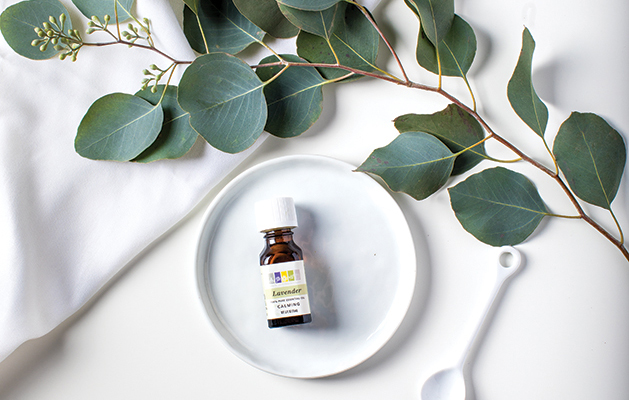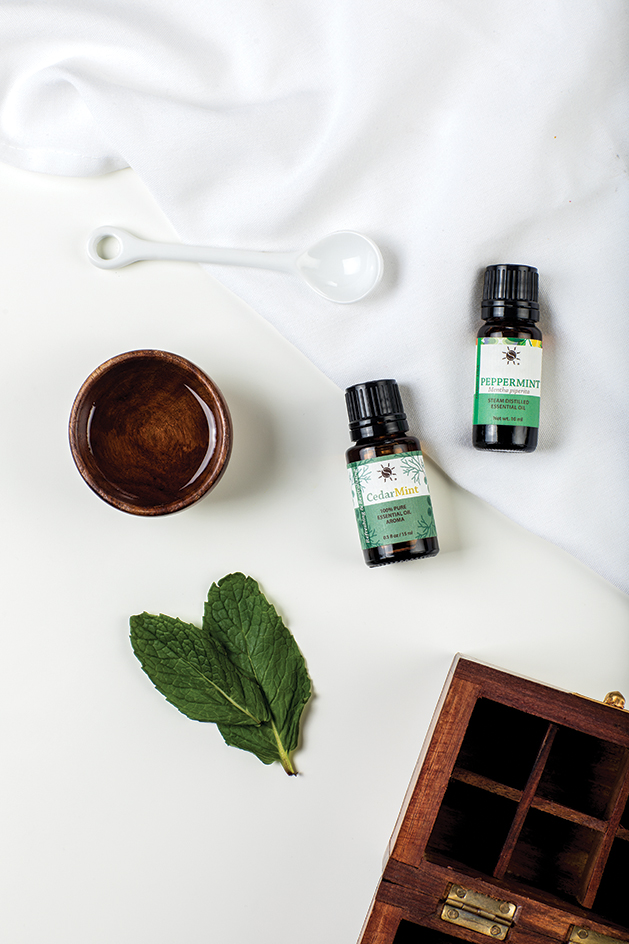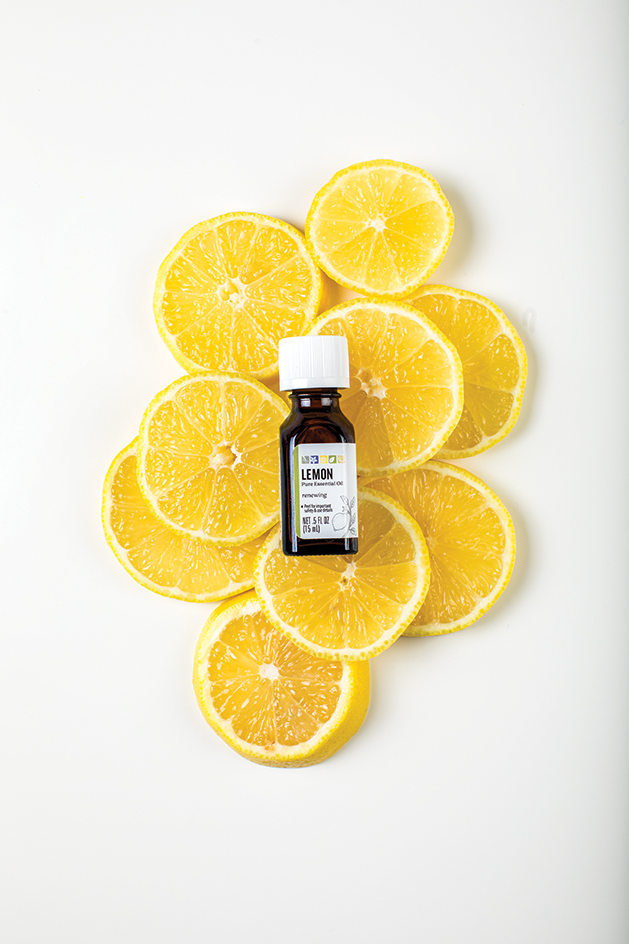
People automatically associate lavender with relaxation. Lavender is often used for anxiety. Photos: Chris Emeott
Do these wildly popular remedies really work?
Humans in most every culture have long sought the potential benefits of medicinal plants. In contemporary society, essential oils have gained traction as a go-to remedy for conditions like headache and insomnia, and we wanted to know more. So, we asked Lynn A. Gershan, MD, CM, medical director for integrative health and wellbeing at the M Health Fairview University of Minnesota Masonic Children’s Hospital for some insight.
What are essential oils?
Essential oils are a concentrated liquid extracted from plants and contain volatile chemical compounds, volatile meaning they evaporate easily in normal temperatures. Unlike “essential” vitamins and nutrients necessary for health, the word “essential” in this case means the essence of the plant.
Do all plants produce essential oils?
No. Over 3,000 plant species produce essential oils of any type, but only about 300 of these are available commercially, with 125–150 used commonly in aromatherapy. Gershan notes there is a difference between herbalism and medical aromatherapy which uses a very concentrated part of the plant, meaning less is more. “We should respect the plant and use caution regarding sourcing of this valuable resource and their effects,” Gershan says.

What is aromatherapy?
Aromatherapy means different things to different people. For example, the perfume industry uses aesthetic aromatherapy. In marketing, someone might want to determine which scent inside a store would encourage purchases. Think of how realtors might suggest fresh baked cookies or bread as an inviting scent inside a house for sale. This is loosely called psycho aromatherapy. At the Center for Spirituality and Healing, Gershan and her staff practice medical aromatherapy using essential oils to achieve a specific clinical effect.
What conditions are essential oils good for?
Essential oils can be good remedies for things like nausea, anxiety, headache and insomnia. Gershan says, “What we do is try to pair [holistic remedies] with some of the medical components of someone’s treatment plan. That’s why it’s called integrative medicine. We wouldn’t suggest peppermint oil would completely take away a headache, but it may synergize or work in combination with a patient’s overall medical treatment.”
How can essential oils be safely used?
“There haven’t been a whole lot of studies,” says Gershan. “In medicine, we look at randomized, controlled clinical trials, so lacking that, we look for something that does no harm.” For patients receiving immune-suppressants or transplant patients, essential oils can interfere with medication. So, that’s a no, no. Everyone else is advised to consult with their primary care provider before beginning any type of aromatherapy. If your doctor cannot answer your questions, they can refer you to appropriate resources for information. After that, Gershan says, “Choose the appropriate oil for the condition or reason you are trying to help. Also, we never recommend ingesting essential oils. There is some evidence-based reasoning for ingestion when working with gastrointestinal issues or for patients with irritable bowel syndrome, otherwise, there are no good reasons to ingest [essential oils.]”
Gershan suggests first doing a patch test on the inside of the wrist to ensure you’re not allergic. Be sure to use essential oils at the proper dilution. “In pediatrics, we have a group of essential oils that our nurses are very well versed in and that are pre-diluted,” says Gershan. “We never use [essential oils] in children under age 2 unless there is a higher level of training.” If you’re ever unsure, Gershan suggests consulting with a certified aromatherapist for guidance. Also, be sure to store your essential oils properly because they can degrade, oxidize or even become other chemicals over time. Store in dark bottles inside a refrigerator and take extra precautions whenever children are around.
Check with your veterinarian to ensure pet safety whenever bringing essential oils into the home. Some can be harmful to dogs and cats. Never use essential oils on your pets’ skin, nails or fur without guidance from your veterinarian and keep oils out of pets’ reach.
How can consumers determine quality?
“That is really hard because there are no FDA regulations,” says Gershan. Identify as far as you can determine, that your supplier, whether a person or a company, is reliable and that their essential oils are being produced according to best practices. Remember, essential oils come from plants. It takes 250 pounds of lavender to make one pound of essential oil so there can be a lot of financial pressure on suppliers to cut corners. Some companies adulterate their essential oils because it’s expensive to buy the real thing. The word “pure” means nothing without regulation. So be aware and try to learn where your essential oils come from and if the plants have been grown according to a commitment to sustainability.
That said, you need not be overwhelmed by the science of it all. Consider this, if you apply three different lavender essential oils to a scent strip, they will each smell a little bit different. The first thing you smell are the lighter fractions or the more easily evaporating chemicals. Come back later and smell what’s left. Do you like what you smell? Is this something you feel you can use over time?

What are some commonly used essential oils and what are they used for?
Lavender oil:
People automatically associate lavender with relaxation. Lavender is used most for anxiety. In some studies, it’s been shown to be beneficial for burns in an appropriate dilution so that some of its chemicals work as an antibacterial and analgesic. “It’s a pretty amazing oil,” says Gershan. “But all lavender oils are not equal. Spike lavender has very different properties and wouldn’t be one used for burns. Consumers need to know what they’re getting.”
Tea tree oil:
This is one of many types of melaleuca which has anti-bacterial, anti-fungal and anti-viral effects. It can even be used as an insect repellent. Once again, it’s best to know your supplier and what you’re getting because not all have the same properties. Gershan cautions users to be aware of proper dilution to avoid skin sensitivity. “It may not be until after the fourth time you’ve been exposed that you experience a rash or irritation.”
Chamomile oil:
Some types have sedative properties and it can be good for gastrointestinal distress by diluting a solution for rubbing on the belly. Another type can be used on the skin since it has great anti-inflammatory properties. Depending on how you mix it, a solution could be helpful for eczema. Be aware of any potential allergies. Certain flower or plant allergies can be triggered by plant-based oils.
Peppermint oil:
Peppermint oil has been used for nausea for hundreds of years. But remember, less is more. Too much peppermint can actually make you nauseous. It works by relaxing smooth muscle, so it’s a great anti-spasmodic when diluted and rubbed on the back or belly. It’s used a lot for headaches and works particularly well for tension headaches when muscles in the jaw and scalp are very tense. Gershan says, “An interesting study in postpartum women who had trouble urinating seemed to be helped [with use of peppermint oil].” She adds that the muscle around our blood vessels is also smooth, so users with any blood pressure issues should use caution. Peppermint oil is not recommended for children under age 12 without a doctor’s consultation.
Lemon oil:
Citrus oils have similar properties that are effective in energizing or alerting. “Some studies have been done in Alzheimer’s patients and have helped with alertness,” Gershan says. Another good use might be before taking an exam. Those with ADD and ADHD have also found citrus oils helpful either by diffusion or inhalation. Topical use of citrus oils has an increased incidence of skin sensitivity and sun sensitivity and can cause rashes. Gershan says, “Citrus oils also degrade pretty quickly every time you open the bottle. So, open only when you need to and store it in fridge.”
Are diffusers better than topical use?
“There are wet and dry diffusers,” says Gershan. “Anyone with respiratory issues [e.g. asthma or cystic fibrosis] or are immunocompromised should use a dry diffuser because even if you clean a wet diffuser, there is still potential for mold to grow and mold spores to be emitted.” It’s also good to be sensitive to other people who are smelling your diffuser, how long you have it on and what you’re using it for. Some people can get headaches and children are more sensitive. Plus, your brain habituates to most scents after a while. Everyone is different. But if you’re smelling the same thing all of the time, you may experience a decline in efficacy.






















